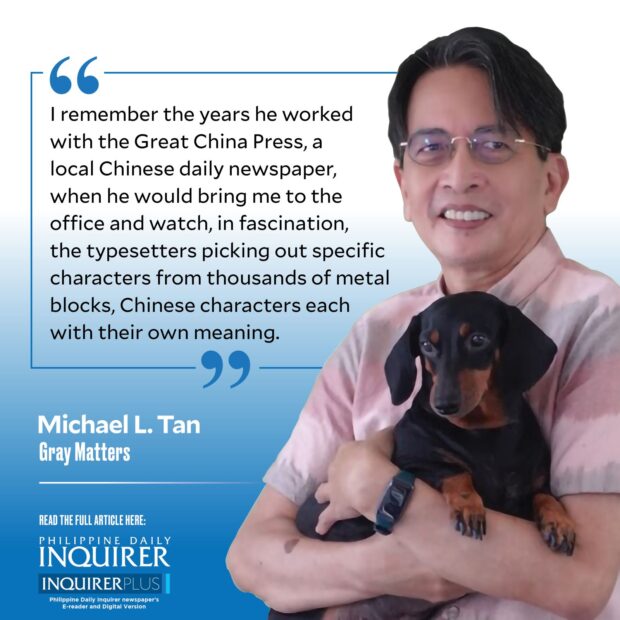My father was in Zamboanga when I was born, having accepted a one-year contract to be a very young (he was 28) principal of a Chinese school there. Even after he returned to Manila, he was often away and, when around, was distant.
When I had to leave for the States to study, he shook my hand and wished me luck, adding, “Your mother will take you to the airport.”
My mother, very much the overindulgent Nanay Pinay, tried to console me, explaining that the paternal distance was a Chinese norm.
I’m not complaining. I’m doing this Father’s Day column because, through the years, I’ve realized that he did try to become more like a father in the Filipino mold, which was very much better compared to the typical Chinese father (but which could still do with more improvement).
I remember the years he worked with the Great China Press, a local Chinese daily newspaper, when he would bring me to the office and watch, in fascination, the typesetters picking out specific characters from thousands of metal blocks, Chinese characters each with their own meaning.
My father did share stories of his press years — he wrote, too, for the Evening News, in English, and was assigned to Malacañang and foreign relations. And so my father, the journalist, did rub off on me even when I was in high school.
I remember the occasional weekend break, in particular to a place called Alligator Lake (also known as Tadlac Lake, near Los Baños, Laguna), intended for Spartan male bonding. Once he tried to get me to learn, unsuccessfully, to fire pistols. When I became University of the Philippines Diliman chancellor, I requested that security guards assigned to my residence should not be armed.
He called me a bookworm, my mom insisting it was a term of endearment but I wondered … until one day, coming home from a business trip to Europe, he opened his suitcase, which was filled with a dozen, palm-sized “Lilliput dictionaries” — German and Spanish and French and even a Latin one. Somehow, he had recognized my growing interest in languages.
I was a kind of trophy son to be introduced to his VIP friends. He loved telling friends about how my first encounter with the Taiwanese ambassador was in the lockers of the erstwhile US Army and Navy Club, and that the ambassador was stark naked.
In college, we argued over Chinese politics — he was pro-Taiwan and he labeled me a Maoist. Times change and years later, he would proudly tell his friends about my official trips to China as a guest of the universities. In our own trips to China, there was pride, too, when I could carry a conversation in Chinese — Mandarin and Hokkien — especially with his friends from his alma mater in Shanghai.
Our relationship mellowed through the years, our differences reduced to the more trivial, for example, what to wear. Why are you in black, he would ask, a forbidden color.
He could not understand why I could never wear a coat and tie; I explained that in a previous life, I must have been a dog kept on a collar and chain. I resisted the temptation to ask him if I could wear a scarf instead.
He would complain about my gifts, especially food items, going through the ritual of tasting the gift and then going, jia pai chia, oh, this tastes so bad. I had learned, through the years, that was a Chinese elder’s way of saying, “You shouldn’t have to spend for me.”
One thing he could appreciate, without token complaints, were recordings of Chinese women singers like Teresa Teng, which I had taught his caregivers to find on YouTube. When I’d visit, Teresa Teng singing about the moon bringing in love meant that he was in a good mood.
He died in 2018 and right before his cremation, I felt I just had to kiss him on the forehead, and for a moment, I was terrified that he would sit up and protest. He didn’t, of course, and I felt we had come to terms with each other. Thank you, dad, some of you did rub off on me.


